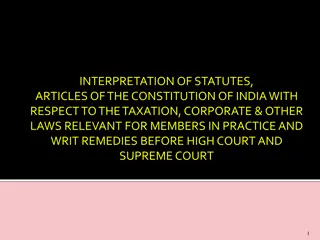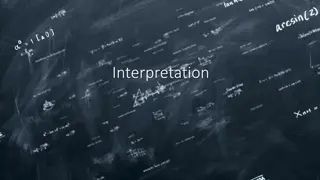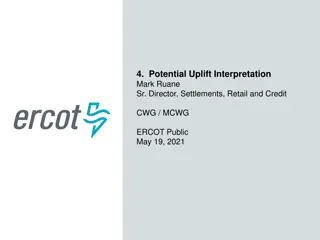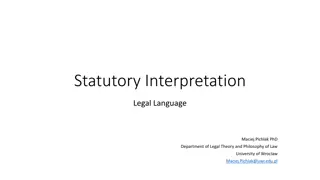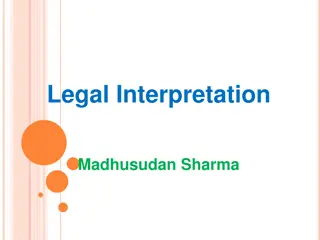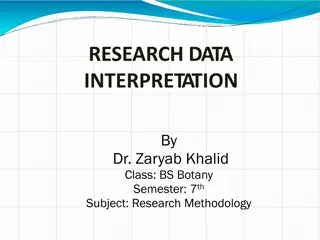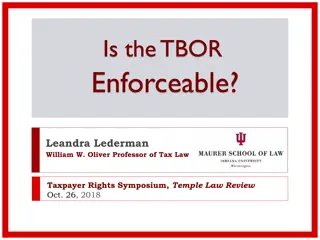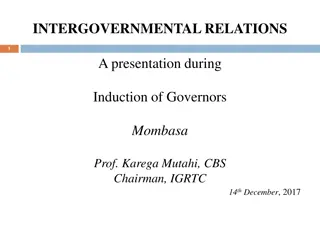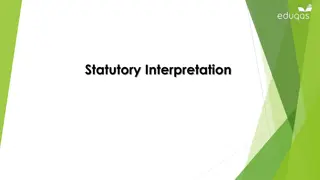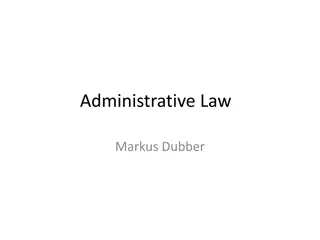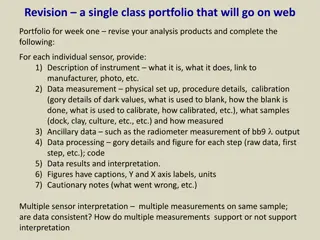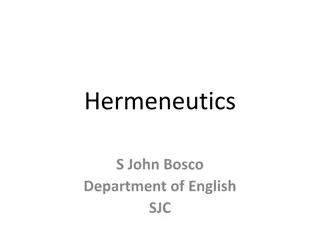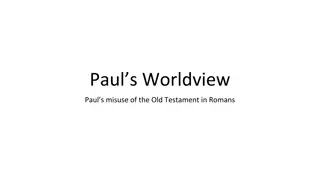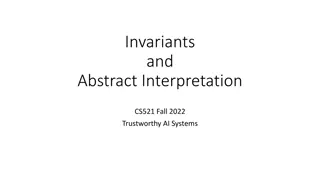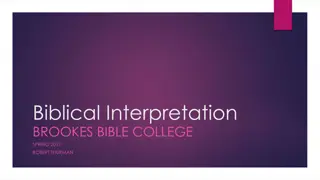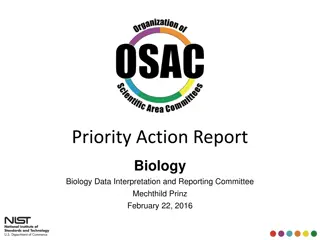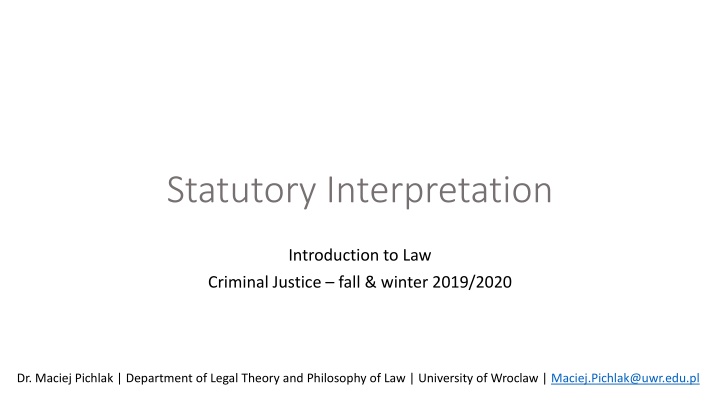
Legal Interpretation Methods and Principles
Explore the intricate process of legal interpretation, including linguistic and non-linguistic methods, systemic considerations, and historical legislator intentions. Delve into the significance of literal interpretation and the balance between natural reason and the judgment of law in resolving legal controversies.
Uploaded on | 3 Views
Download Presentation

Please find below an Image/Link to download the presentation.
The content on the website is provided AS IS for your information and personal use only. It may not be sold, licensed, or shared on other websites without obtaining consent from the author. If you encounter any issues during the download, it is possible that the publisher has removed the file from their server.
You are allowed to download the files provided on this website for personal or commercial use, subject to the condition that they are used lawfully. All files are the property of their respective owners.
The content on the website is provided AS IS for your information and personal use only. It may not be sold, licensed, or shared on other websites without obtaining consent from the author.
E N D
Presentation Transcript
Statutory Interpretation Introduction to Law Criminal Justice fall & winter 2019/2020 Dr. Maciej Pichlak | Department of Legal Theory and Philosophy of Law | University of Wroclaw | Maciej.Pichlak@uwr.edu.pl
Legal interpretation The process of determining the meaning of legal rules. Lex et ius Ius: a) the totality of law b) lawyers-made law c) final legal decision Ius est ars boni et aequi. Celsus
Legal reason a controversy 'God had endowed His Majesty with excellent science, and great endowments of nature ...' still 'his Majesty was not learned in the laws of his realm of England, and causes which concern the life, or inheritance, or goods, or fortunes of his subjects, are not to be decided by natural reason but by the artificial reason and judgment of law, which law is an art which requires long study and experience, before that a man can attain to the cognisance of it.' Sir Edward Coke to King James I, in 1607 The first thing we do, let's kill all the lawyers. W. Shakespeare, Henry The Sixth, Part 2, about 1590
Methods of interpretation in practice 1. No vehicles in the park. 2. An ambulance may go into the park. An ambulance crew on a picnic?
Methods of interpretation (civil law) non-lingustic literal the linguistic meaning -common rules -typically legal rules systemic teleological -axiological context -pragmatic context rule as a part of a system -features of system -principles of system - position of the rule in system historical -intention of the legislator
Literal interpretation (linguistic, grammatical) Literal interpretation (or textualism) may be defined as the action of explaining what a normative text conveys by looking at the usual meaning of the words contained therein. The literal interpretation of a clear and precise provision is the method of interpretation that best reflects the principle of legal certainty Lenaerts and Gutierrez-Fons 2013 The doctrine of sens clair / acte clair and Clara non sunt interpretanda
When language is not enough Whosoever steps on grass, or destroys plants, shall be subject to penalty of Standards of inconsistency or absurdity Systemic or purposive interpretation
Systemic interpretation (systematic) Need for the consistency and the completeness of system The role of legal principles each provision ( ) must be interpreted in such a way as to guarantee that there is no conflict between it and the general scheme of which it is part . Lenaerts, Gutierrez-Fons Argumentum a rubrica During interpretation, the location of the rule in legal system should be respected. Is industrial alcohol an alcoholic beverage?
Teleological interpretation (purposive, functional) Argumentum ad absurdum One may not choose the interpretation that guides to absurd, ridiculous or unacceptable consequences. Purpose or ratio legis The rule should be interpreted in accordance with and with respect to its ratio legis/ purpose. ratio legis: reasons for enacting the rule (its goal or value it serves)
Historical interpretation The intention of historical legislator The role of travaux pr paratoires
Outcomes of interpretation literal narrowing extensive The principle of the priority of literal/ linguistic interpretation The subsidiarity of non-linguistic methods of interpretation
Outcomes of interpretation Extensive interpretation is usually restricted: on exceptions (exceptiones non sunt extendendae) on lex specialis rule on rules limitating fundamental rights in criminal law to disadvantage of the accused
The park revisited 1. No vehicles in the park. 2. An ambulance may go into the park. An ambulance crew on a picnic? Relations of methods: exceeding the literal interpretation
Relations of methods: the vagueness of language Can a flatboat be a residential building? Tax law
Relations of methods: a mutual support When interpreting a provision, according to which When a witness is staying abroad, a protocol of his previous confessions may be read in front of a court [without his or her direct presence] , a court decided that this provision is applicable to witnesses who are staying abroad both permanently or temporarily. The court argued that: according to the clear meaning of the interpreted rule there are no reasons to differentiate the situation of both groups of witnesses (these staying abroad either permanently or contemporarily); the intention of issuing this rule was to ensure the swift and unimpeded course of criminal procedure, what reflects the general principles of the swiftness and the effectiveness of criminal trial, with which the proposed interpretation is consistent; one should take into account the fact that the interpreted rule belongs to the law of criminal procedure. The interpretation proposed by the court is in line with the basic tenets of criminal proceeding, according to which a witness may be interviewed by proper authorities of foreign country (within the procedure of international legal aid), but such a solution is limited to exceptional situations, when confessions cannot be obtained in another way.
Methods of interpretation in common law and civil law Civil law Common law Linguistic interpretation Plain meaning rule Systemic interpretation Purposive (teleological) interpretation Golden rule Mischief rule
The plain meaning rule If the words of the statute are in themselves precise and unambiguous, then no more can be necessary than to expound those words in their natural and ordinary sense. The words themselves alone do, in such case, best declare the intention of the lawgiver . Sussex Peerage Case, 1844 The golden rule: In construing statutes the grammatical and ordinary sense of the words is to be adhered to, unless that would lead to some absurdity, or some repugnance or inconsistency with the rest of the instrument, in which case the grammatical and ordinary sense of the words may be modified, so as to avoid the absurdity and inconsistency, but no farther . Grey v. Pearson, 1857
The mischief rule Four matters were required by the court to be discerned and considered , in order to carry out the sure and true interpretation of statutes : (a) what was the common law before the making of the Act?; (b) what was the mischief and defect for which the common law did not provide?; (c) what remedy has Parliament resolved and appointed to cure the disease?; (d) the true reason of the remedy. (De Cruz 1999)
The mischief rule in pratice: Is bicycle a carriage? Corkery v Carpenter [1951] The Licensing Act 1872

